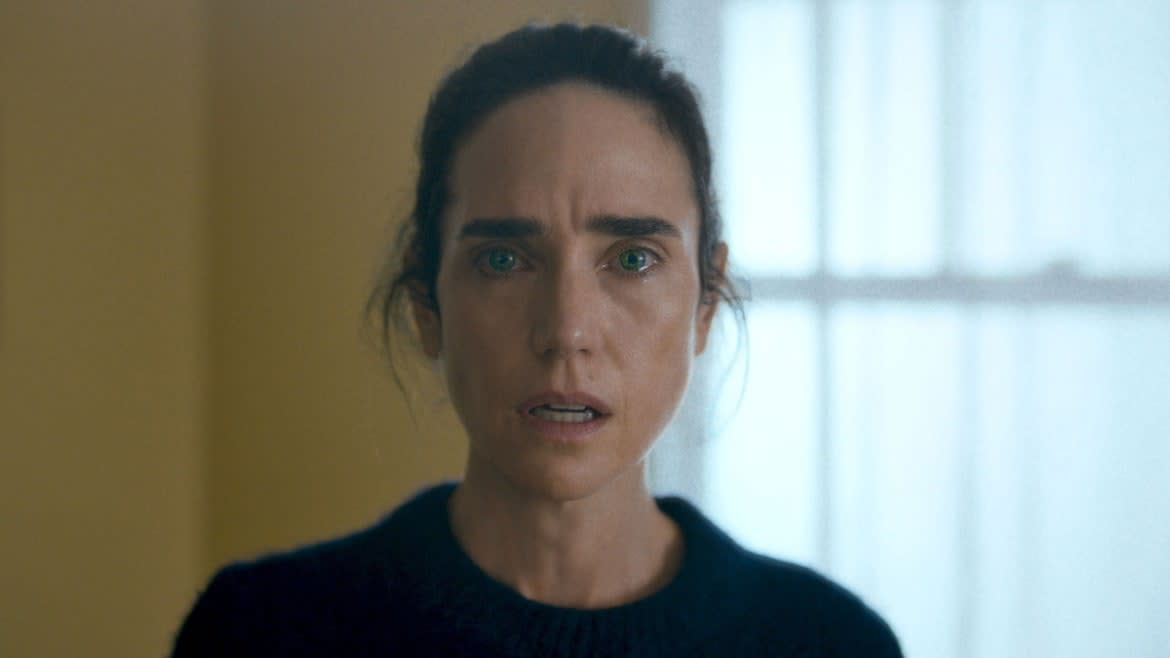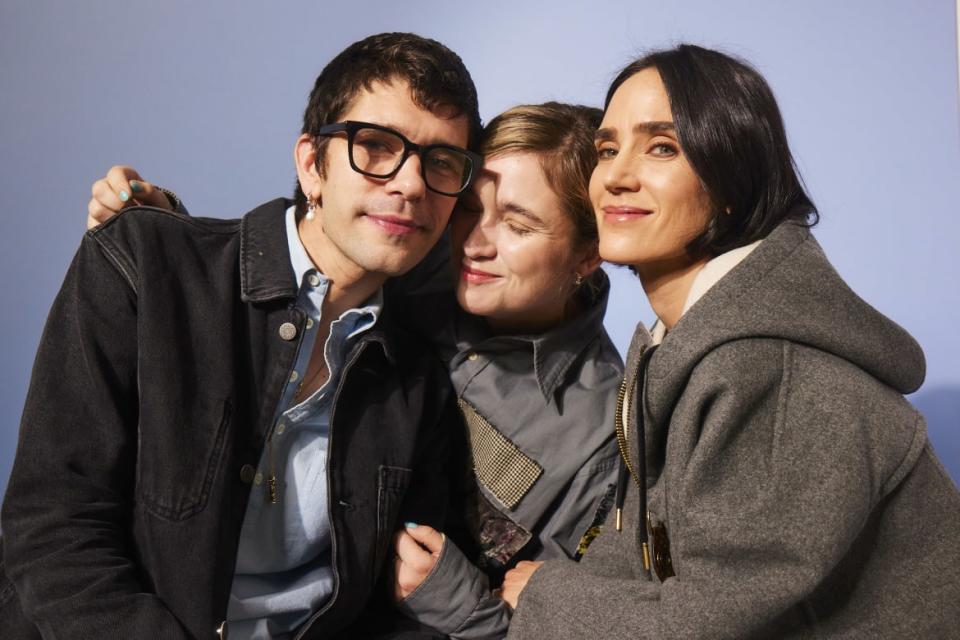Sundance’s ‘Bad Behaviour’ Is an Incoherent Mother-Daughter Nightmare

- Oops!Something went wrong.Please try again later.
- Oops!Something went wrong.Please try again later.
“You are a toxic fucking nightmare,” spits a character in Bad Behaviour to Lucy (Jennifer Connelly), and in many respects, it’s an accurate assessment of the divorced mom. Alas, one hears and sees Lucy’s wretchedness far more than one comprehends it, and that shortcoming proves to be emblematic of New Zealand actress Alice Englert’s maiden directorial effort, which strives to scrutinize mother-daughter relations through a darkly comedic lens and only comes up with grating incoherence.
Debuting at this year’s Sundance Film Festival in the World Cinema Dramatic Competition, Bad Behaviour sidesteps table-setting from the start, save for a brief phone conversation between Lucy in Oregon and her twentysomething daughter Dylan (Englert) in New Zealand, during which both pretend to be too busy to talk before the call mercifully drops out.
This implies that their relationship is strained to the point of physical as well as emotional estrangement. However, it’s not until much later that anything resembling clarity about their situation emerges. Worse, once they finally reunite, things only become a tiny bit clearer, and solely with regards to specifics; the exposition that the two spout while arguing about past conflicts fills in some basic blanks, if hardly affords a real sense of their fraught dynamic.
The crux of the duo’s issues appears to be that Lucy was a lousy mom due to her depression and resultant detachment and callousness—all of which was brought about by Lucy’s bitter bond with her own mother. To cope with her gnawing dissatisfaction, Lucy has embarked on the latest in a long line of retreats, this time to a secluded rural getaway where she and others are spending time at a seminar titled “Get Lost with Elon Bello.”
‘Cat Person’ Devours Story’s Viral Discourse and Coughs Up an Unwatchable Hairball
As played by Ben Wishaw, Elon is a soft-spoken sage who has his paying students take turns sitting opposite him in a chair and expressing their deep, dark, shameful secrets. For Lucy, that has to do with feeling disliked and abandoned by those closest to her, as well as some vague discontent about being forced, as a teenager, to pursue a Hollywood career that resulted in a brief starring role on a popular warrior-girl show.
That detail seems relevant in the moment, but like most aspects of Bad Behaviour, it’s a potentially intriguing thread that’s almost instantly discarded. Rather than providing some foundational information about Lucy, Englert instead tries to convey who she is by spending time in her company.
What’s plain is that she’s an anxious, unsettled mess who craves the enlightenment that Elon promises—and, in a quiet one-on-one chat near a pair of garbage cans, says he’s achieved—and yet can’t stand this enclave, where participants are asked to investigate themselves through candid sharing and long bouts of silence. The fact that everyone here is a gullible dope in disarray is hard to miss, even to Lucy, who winds up being particularly annoyed by perfume model Beverley (Dasha Nekrasova), who quickly reciprocates her antipathy.
While Bad Behaviour pits Lucy against Beverly, most notably in a group conversation marked by competitive New Age-y blather, it also cuts back to New Zealand, where Dylan is working as a stunt professional on a fantasy movie alongside a fetching colleague.

As embodied by Englert, Dylan is an impulsive, excitable young woman who isn’t afraid of suffering a few bumps and bruises and is content to flirt with her coworker, throw herself about with semi-reckless abandon, and treat her injuries with ice packs and booze. Though Englert wrote and plays the character, Dylan feels as half-formed as Lucy, and she doesn’t develop even once two characters suffer simultaneous (if differing) calamities that force them to reconnect and, in the process, reconcile.
Those violent parallel incidents are supposedly meant to be funny, yet as with so much of Bad Behaviour, the tone Englert is going for remains elusive, and more than a bit perplexing, with Lucy’s caustic combativeness and Dylan’s anguish (which has ostensibly driven her to her rough-and-tumble profession) never resonating as genuine.
Much of that is the byproduct of the writer/director’s lurching script, which is both in your face and frustratingly oblique. Much moping, fuming and fretting takes place in Oregon and New Zealand, all of it coming across as the sort of surface-level theatricality that makes for a good trailer but falls flat in a story that lacks shape, depth and momentum.
Anne Hathaway’s ‘Eileen’ Is Dark, Explosive, and Has One Helluva Ending
Coming off Top Gun: Maverick, Connelly does a whole lot of emoting, her body language alternately coiled and fidgety, and her face in an incessant state of unease, whether she’s glaring at idiot companions, seething at a bright light that won’t stop flickering right outside her room’s window, or rolling her eyes at Elon, who soon outs himself as a charlatan with nothing but stolen hot air to dispense.
An exercise in which everyone pretends to be either a mother or a baby underlines that Lucy is both the horrid monster she claims to be and also, deep down, a wounded child. For all her massive exertion, though, Connelly can’t make her unlikable protagonist compelling because, at just about every turn, her acting shows. Her performance is a case of effort undermining authenticity.
Bad Behaviour’s third act is somehow more meandering than the material that preceded it, charting Lucy and Dylan’s uneasy rapport and testy attempts to hash out their differences at the same time that Lucy tries, half-heartedly, to avoid jail with the aid of a public defender (Karan Gill).
Gael García Bernal Is Sensational as a Gay Lucha Libre Star in ‘Cassandro’’
A prolonged breakfast-ordering sequence vainly searches for laughs and is followed by a trek through the woods that features so many implausible developments, statements and actions that it’s hard to tell if this is another of the film’s dream sequences—one of which, just to further exacerbate the film’s helter-skelter construction, includes animation.
Following a fleeting cameo from The Power of the Dog director Jane Campion (Englert’s mom) and a romantic tryst of absurd nonsensicality, Bad Behaviour climaxes with more posturing on a mountain peak—a fitting destination for a film that succeeds only in constantly reaching new levels of direness.
Keep obsessing! Sign up for the Daily Beast’s Obsessed newsletter and follow us on Facebook, Twitter, Instagram and TikTok.
Get the Daily Beast's biggest scoops and scandals delivered right to your inbox. Sign up now.
Stay informed and gain unlimited access to the Daily Beast's unmatched reporting. Subscribe now.

